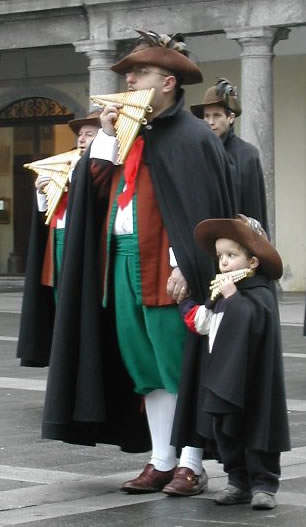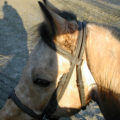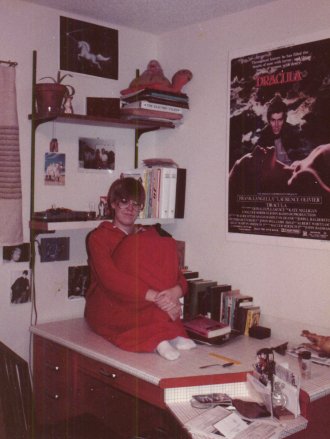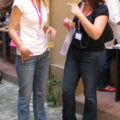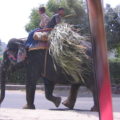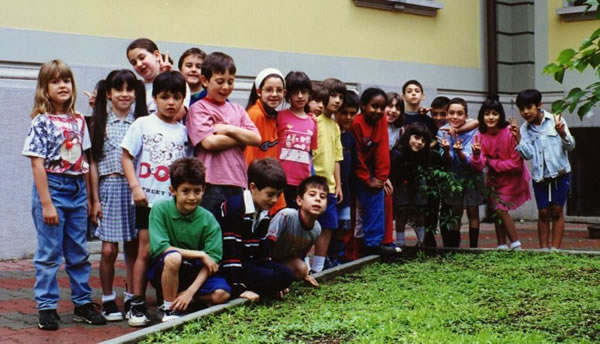I had a thing about vampires long before Buffy the Vampire Slayer came along. It began in the summer of 1978, when I traveled to the US with my folks on home leave. The hit Broadway production of “Dracula” had been made into a movie, with Frank Langella reprising his title role. I was 15 years old, and for the first time in my life got a crush on a movie star. (Of course it’s entirely accidental that the man who later became my husband looked like him!) I saw the movie two or three times, and read the movie tie-in edition of Bram Stoker’s original book. By the time I returned to school, I was hooked on all things vampiric.
When I got to college, I began collecting vampire books. I’ve kept only the best ones over the years, including a complete set of Chelsea Quinn Yarbro’s Saint-Germain series. Saint-Germain is a very sympathetic vampire, who has lived for about four thousand years. This gives Yarbro plenty of scope for the deep historical research she clearly loves; the books are richly detailed snapshots of certain times and places in history, in which the “bloodsucking fiend” is usually the most humane creature around, striving to save those he loves from the cruelty of other humans. I should also mention that Yarbro is a VERY good writer.
Laurell K. Hamilton’s series Anita Blake: Vampire Hunter is also worth a look. I read the first few thanks to a friend from St. Louis, who had them because the writer is from St. Louis and sets her books there. The writing was rough at first, but Ms. Hamilton has improved at her craft over the course of 12 books or so (and a new, different series just started), and the premise is fun: vampires, werewolves, etc., really exist, and have been granted civil rights by the US government – so long as they behave themselves. When they don’t (which is often), bounty hunters like Anita Blake step in to take them out. (2006 – Recent books in the series have become a strange sort of horror-porn – fun, but not exactly high literature… )
I was a big Anne Rice fan, at least for the first three Louis/Lestat books, and was thrilled when “Interview with the Vampire” was made into a movie. Which had its flaws; couldn’t they have gotten anyone but Brad Pitt to play Louis? But Tom Cruise was excellent as Lestat, and one of my favorite film scenes of all time is the final one, with Lestat speeding across the Golden Gate Bridge in a convertible (at night, of course) with “Sympathy for the Devil” blaring out of the radio. I actually never saw the movie til I got it on video. Rossella was young then, and I figured it wasn’t suitable for her, so I watched it when she wasn’t around. But she saw it on the shelf and got curious, and when she was 9 or 10 I let her watch it. Then she got into vampires. I dunno, maybe it’s genetic?
Soon after that I heard about “Buffy.” I only knew vaguely that it was about some sort of female teenage superhero, but I spotted a magazine about the show in the UK, and bought it for Ross. We were both skeptical: we like vampires; would we like a show that seemed, by its title, to be all about killing them? Still, I was curious enough to take up my friend Adrian on his offer to send us the videotapes (then commercially available in the UK, but not the US). As I mentioned, we were hooked within the first five minutes. I’ll spoil things for you a bit by explaining how.
Joss Whedon, the show’s creator, has said that he came up with the vampire slayer concept because he was tired of the many horror movies where a ditzy blonde wanders into a dark alley, is followed by some sort of fiend, and winds up messily dead (okay, I’m paraphrasing). He thought it would be fun to turn the tables, and have the blonde beat up the monster.
I didn’t know that when I saw the first episode. It begins with a small blonde, dressed in a pleated skirt like a Catholic school girl, and a slightly older-looking guy, breaking a window to get into a school at night. Science classroom skeletons and scary music create atmosphere. The girl is nervous. “We’re just gonna get in trouble,” she says. Big macho guy reassures her: Everything’s cool, no one will see them. “I heard a noise,” she says tremulously, looking away, down the dark hall. Scarier music. (And I’m practically hiding under the sofa – I am easily freaked out by horror movies.) The guy leers evilly behind her. “No one here,” he says. The music swells. “Okay,” says the girl. She whips around to face him, and is suddenly transformed, with fangs and yellow eyes. She sinks her teeth into the guy’s neck.
I knew right then, before Buffy herself was anywhere in the picture, that this was a great show. Oh, and it’s still okay to like the vampires. There are some good ones in “Buffy,” and they don’t get slayed. Slain. Whatever.
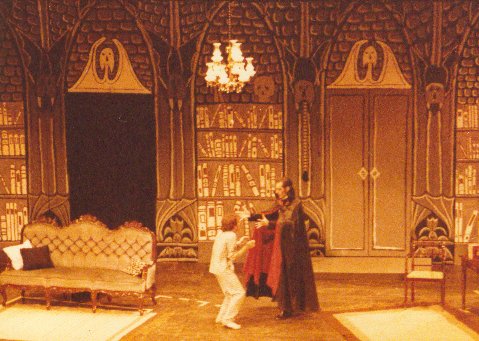
^ Martin Baynes as Renfield and Mike Nicklin as Dracula, Jakarta 1984
Nov 18, 2003
When I wrote the above, I clean forgot to mention one of the biggest vampire events in my life. In 1984, a brief visit to my dad in Indonesia turned into an extended visit when I couldn’t get a visa to study in India as originally planned. Although Jakarta is a big, bustling city, there wasn’t all that much for foreigners to do there in those days, so the expatriate community had to work to keep itself entertained. One means was amateur theatre, in which my dad and his friend Donna were enthusiastic participants.
While I was stuck in Jakarta, my friend Sue came for an extended visit from the US, and we were both happy to get involved in the Jakarta Players production of “Dracula.” The group was using the script by Hamilton Deane and John L. Balderston, originally produced in the 1930s. This play had been revived in the 1970s, starring Frank Langella on Broadway, in the production which was then adapted into a film in 1979.
Indonesia had never signed the International Copyright Convention, so the Jakarta Players… took some liberties with the script, adding entr’acte vignettes more or less taken from the Frank Langella movie, along with a generally more sexy and romantic atmosphere. We even retitled it “Dracula, a Love Story.”
As you can see in the photo above, we stole the set design from Edward Gorey’s sets for the Broadway show, done in his characteristic macabre cartoon style. We also used music from John Williams’ score for the film for mood-enhancing background, and choreographed a dance for the big seduction scene.

Sue and I helped out during many weeks of rehearsal, taking the opportunity to flirt with two cast members we liked (one was the British local head of an airline, the other a Scottish engineer working for an oil company). Sue was eventually appointed stage manager, and I was put in charge of sound effects, which I pulled off pretty well except for that one time when the wolves howling got swapped with the screaming loonies … Our friend Julie played the maid, which so thoroughly infected her with the theater bug that she now works at the Kennedy Center in DC.
A team built the 40-foot-high flats for the set, which were supposed to be painted black, white, and grey, just like the Gorey drawings. When we raised the flats on the Jakarta International School stage, however, they were brown and grey. The woman put in charge of set painting had gone to a shop in Jakarta which happened to be out of black paint; the shopkeeper there told her there was none to be had anywhere, here, have some nice brown instead. And she believed him. We all looked at the brown, and it looked pretty stupid. So Sue and I volunteered to repaint the entire set in the week we had left before opening night.
This wasn’t too difficult for the first six feet going up. Then we started standing on furniture and ladders. Then we had to pile things on other things, building up increasingly tall and rickety “scaffolding” so we could paint higher and higher up the set. When we got near the top, there was nothing else we could safely pile up. So the light bars were lowered down to the stage, we sat on them, and were raised 40 feet up so we could paint the top of the set. This was a supreme effort for me, because I am terribly afraid of heights. But we finally got it all done, and it looked good.
The show came together well, and was warmly received by the expatriate and Indonesian audiences. Best of all, it kept us all very happily busy for months. Jakarta Players went on to do still more ambitious productions, including “Cabaret,” “Pajama Game,” and “Greater Tuna.”
Vampire Stuff at Amazon
Saint-German books: Amazon US | UK
Dracula: Original Motion Picture Soundtrack by John Williams (excellent, romantic score)
Anita Blake books: US | UK
Anne Rice’s Louis/Lestat books: US | UK
Interview with the Vampire on DVD: US | UK

